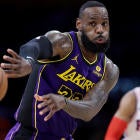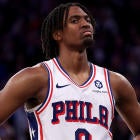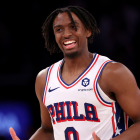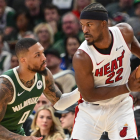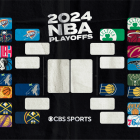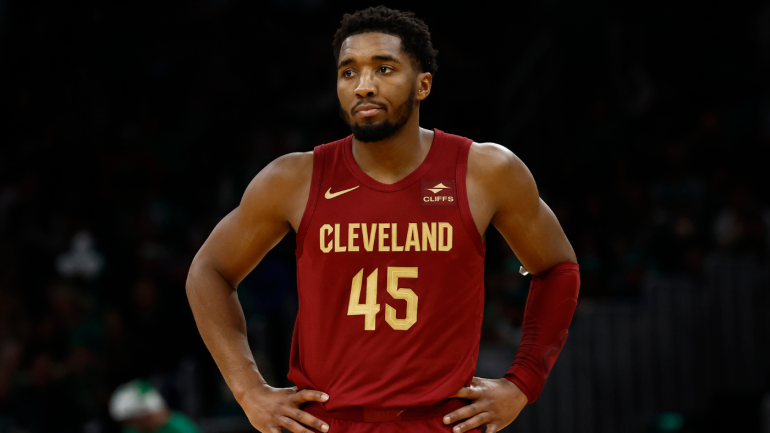
The Cleveland Cavaliers took a bold risk when they traded for Donovan Mitchell. After all, the All-Star guard seemingly had his heart set on another destination. "I thought it was New York," Mitchell said after he landed in Cleveland. "I'm not gonna lie to you. You know, obviously, who doesn't want to be home next to mom?" He handled the surprise trade professionally. Cleveland gave him a theoretical chance at a championship. That was what motivated the Cavaliers to take the risk of acquiring him in the first place.
With Evan Mobley, Darius Garland and Jarrett Allen already in tow, the addition of Mitchell gave Cleveland four young players with All-Star potential. Just as importantly, Mitchell had three years of team control left on his deal before he could become a free agent in 2025. That contract mitigated the risk of the deal. It effectively gave the Cavaliers two years to prove to Mitchell that Cleveland is where he belongs. If they failed to do so? They'd still have a year left to trade him.
The roster wasn't ready in Year 1 of the Mitchell experiment. Come Year 2, some clever tweaks might have gotten it there if injuries hadn't intervened. Instead, Cleveland started 14-12 as it dealt with absences across the board. Now, Garland will miss several weeks with a broken jaw and Mobley will be out for a period that potentially will be measured in months due to knee surgery. Any championship hopes the Cavaliers had entering the season are now effectively on life support. That naturally raised questions about Mitchell's future in Cleveland, though he's sidestepped them.
"My job is to focus on this," Mitchell said when asked about his future, according to The Athletic's Joe Vardon. "We have two guys that are out, so I'm not answering anything. And, no disrespect, I appreciate that you have to ask the question, but I'm not going there with any of those questions. My focus is on these guys being out, us trying to find a way to get wins."
It's an admirable sentiment. It is also a dangerous one to get attached to. Players rarely publicly acknowledge the uncertainty of their own futures even when, in hindsight, those futures were nearly certain to be spent elsewhere.
For example, Kawhi Leonard said he wanted to retire a Spur three months before demanding a trade. This is the reality of the modern NBA, and it's the one staring down the Cavaliers right now. Even Mitchell's former teammate Joe Ingles thinks he's headed for the Big Apple. "This is like non-bias, no outside info, I think he'll play for New York one day, whether that's sooner or later," Ingles said on 97.5 The KSL Sports Zone. The majority of the reporting on Mitchell's future, though limited by the timeframe at play here, has suggested the same thing.
This was a distinct possibility the moment Cleveland acquired Mitchell. The obvious goal was to build a championship team around him, and the odds of them doing so were reasonable at the time. It hasn't panned out that way. Year 1 is already lost, and Year 2 is quickly heading in that direction. Keep him through Year 3 and you risk losing him for nothing. But if this season is indeed lost and keeping him for next year is too risky for a Cleveland team that is largely out of tradable assets, an alternative path does exist here. It would probably be worthwhile for the Cavaliers to start exploring Mitchell's trade market now.
With two postseasons left between now and Mitchell's free agency, teams outside of the New York metro area could potentially get into the bidding. Might the Golden State Warriors be desperate enough to throw their entire future at Cleveland for the sort of star that could fix their offense? Or could a younger team like the Orlando Magic sense the same opportunity that Cleveland did in the summer of 2022 and try to strike quickly in the hopes of convincing Mitchell to stay? If nothing else, making a move quickly puts more pressure on the Knicks and Nets. Mitchell is more valuable today than he will be in July. If he has a wider market, the competition should drive up the price.
Small-market teams rarely take such an aggressive approach to moving their stars. The Jazz did with Mitchell and Rudy Gobert, both of whom had several years left on their contracts when they were traded. It's too early to tell how that rebuild will pan out. Oklahoma City's rebuild has been an unbridled success, and they traded Paul George and Russell Westbrook within a year of re-signing both of them. As Branch Rickey once said, it's better to trade a player a year too early than a year too late.
It's an immensely frustrating position for a Cavaliers team that largely did everything right. They drafted well, made good moves on the fringes, and when the time came for them to take their big risk, they were reasonably well-positioned to see it pay off. But it hasn't, and pretending otherwise would be a far greater risk than trading for Mitchell ever was.















